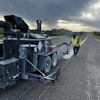It has been three months since Tropical Storm Irene washed out roads all across Vermont, but in the town of Roxbury, it is still difficult to get around. Two bridges on the main road through the town of 700 are still out, and are not expected to be repaired until the middle of December.
In the meantime, drivers must use back roads to get to the nearby town of Randolph, a mild inconvenience now that could become a major issue as winter settles in.
Shawn Neun, chairman of the Roxbury select board, says snow would make using back roads "more hazardous, and it would just make it (take) longer."
Vermont officials estimate that it will take $175 million to $250 million in total to repair the damage from Irene. That is more than a third of what the state planned to spend on all transportation projects this year. Thanks to a presidential disaster declaration, the federal government will pick up a large share of that tab. But Vermont's money has been slow in coming.
That is because 2011 has set a record for the number of declared disasters in a year: Some 39 states are waiting for money to help rebuild their disaster-damaged roads. The requests are stacking up. The Federal Highway Administration now has a backlog of more than $2 billion in requests, or 20 times the amount of money Congress sets aside every year for the agency's Emergency Relief program.
California, for example, is owed $433.8 million for disaster-related road repairs, according to the Office of U.S. Sen. Patrick Leahy.
For states struggling with budget problems, the backlog is yet another fiscal headache. It could delay repairs to damaged infrastructure, and it has already pushed back timelines on other projects. If nothing else, it means state officials must use creative approaches to ensure there is enough money to fix the roads. "States do get reimbursed," says Nancy Singer, an agency spokeswoman. "But it may take some time."




















